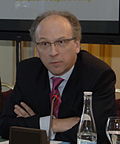| Secretary of State for Territorial Policy | |
|---|---|
| Secretario de Estado de Política Territorial | |
 Coat of Arms used by the Government | |
 | |
Incumbent since December 6, 2023Arcadi España García | |
| Ministry of Territorial Policy and Democratic Memory Secretariat of State for Territorial Policy | |
| Style | The Most Excellent (formal) Mr. Secretary of State for Territorial Policy (informal) |
| Reports to | Territorial Policy Minister |
| Nominator | Territorial Policy Minister |
| Appointer | Monarch |
| Precursor | Minister for Territorial Administration |
| Formation | February 20, 1987 |
| First holder | José Francisco Peña Díez |
| Salary | € 113,145.95 per year [1] |
| Website | seat.mpr.gob.es |
The Secretary of State for Territorial Administrations, currently named Secretary of State for Territorial Policy is the highest official of the Ministry of Territorial Policy responsible for the development of the Government's policy about Spain's territorial organization as well as responsible for the relations between the central government and the regional and local authorities.
Contents
It's also responsible for the supervision of the decentralized departments of the central government in the regions and impulse and coordination of the Conference of Presidents (the main forum of collaboration between the Prime Minister and the regional leaders), as well as the Presidency of the Council of Official Languages in the General Administration of the State. [2]
Directly from the Secretary of State depends the Secretary General for Territorial Coordination.







